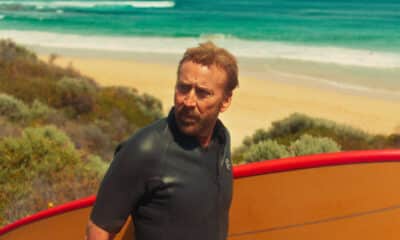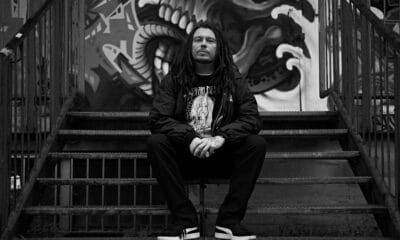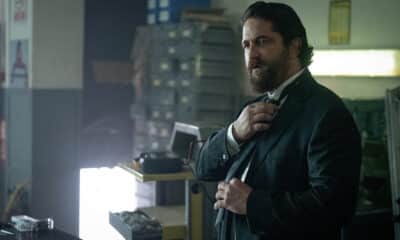Justin McConnell is a man of many talents. In addition to working within the world of acquisitions, he is also a writer, editor, producer and director. He also moonlights as a programmer for Toronto After Dark Film Festival making him the perfect person to screen a film at Arrow Video Frightfest.
McConnell attended the festival with his latest directorial offering – Lifechanger. Lifechanger tells the story of a shapeshifter who is nearing the end of their natural life-cycle. In an attempt to prolong life, they must continually take on new forms, the catch being, in order to do that they must kill. We caught up with McConnell, and his producing partner Avi Federgreen, to discuss the film and its very unusual movie monster.

Justin McConnell Interview for Lifechanger
Where did the idea for Lifechanger come from?
JUSTIN MCCONNELL: In 2014 I was trying to figure out a way to make a movie that I could do for a very low budget, even pocket change. I’d been thinking for a few weeks and then one day I was sitting on a bus and I thought, ‘what if I saw myself out in public, a copy of myself’? Obviously that’s Denis Villeneuve’s Enemy, but from that point the idea grew. I was going through some loss because my best friend and writing partner of ten years had recently passed away. Just the grief over that, and being introspective and thinking back over my past, and how I was in relationships, and how I had to grow as a person sort of informed the overall idea. I have a big background in horror where I grew-up watching everything under the sun, all of that wove together to be whatever this idea grew into. There wasn’t one thing that was ‘this is the idea!’, it just kind of grew.
The shapeshifter isn’t necessarily a ‘monster’ that we’ve seen that much in film, why do you think that is?
JM: I think it’s difficult to pull-off effectively at times. Obviously the classics are The Thing, lots of practical effects made that happen. In this sort of way though, I think it’s an abstract monster. It’s something that you have to think about from a left field approach. It’s not as obvious as… I mean werewolves are shapeshifters, but they’re still werewolves. They become a wolf and that’s it. Vampires have their own set of rules. I think it’s maybe just a slightly abstract monster, and it’s not as popular because it’s not as defined. Netflix has that new TV series now too, The Innocents, so maybe there’s a whole wave of them coming. That always seems to happen. One monster happens for a two-year period, and then another comes along, but we’ll see. I think it’s uncommon because it’s not such an obvious monster trope.

Justin McConnell Interview for Lifechanger
I think my own only personal experience outside of something like The Thing is the TV show Supernatural, but then it’s always really easy because they have set up their own rules for that monster. Plus, as soon as you see Sam or Dean Winchester doing something bad, then it’s probably a shapeshifter.
JM: Yeah he’s probably a shapeshifter. Often times they’re trickster demons or something like that. It’s all about what colour eyes they’ve got, ‘oh ok he’s a dragon’, that’s Supernatural; I’m not insulting it, I actually like the show, but that’s the way they seem to handle most of their monsters. ‘Oh he’s got red eyes, that must mean he’s a Leviathan.’
So when it came to casting your different versions, how hard was that?
JM: Not easy. We shot non-union, which Avi can tell you only gives you a limited actor pool to begin with. We went out and got a lot of self tapes from as many people as we could. We had a great casting directer named Ashley Hallihan who went out and got us self tapes from as many of the talented non-union people in Southern Ontario as she could. That was pretty much our zone that we were able to cast from. We watched all of the self tapes. A few of the roles, Elitsa Bako for the beginning for example, is a friend of mine that I’ve known for six or seven years that I’m quite close with. I sort of wrote that role with her in mind. Lora Burke we’d seen in a film called Poor Agnes which she was very good in. And now we can talk about Jack Foley.
AVI FEDERGREEN: So Jack Foley was basically a house construction company guy who’s friends said, ‘oh you should become a model’, so he became a model. Then he just started acting shortly before Lifechanger and I cast him in a low-budget dramatic film I produced called Fugue. I then introduced him to Justin, and Justin met with him; he did a self-tape which was quite good and then they met in person, and he was cats. He’s only been acting for about a year now.
JM: We were really just looking for the best actor at first, and then at that point we could adapt their performance, discuss the performance as a group and make sure they had similar ticks and similar ways of walking. They had similar mnemonic devices like tapping fingers on a table, just so we’re not stepping on their performances, and they’re still allowed to be performers in the way they want, but there’s this through-line through all of them. It was tough, but I think we found very good people.

Justin McConnell Interview for Lifechanger
I thought Lora Burke was great in Poor Agnes, her character also helped as the constant. We were saying with Supernatural if Sam and Dean are doing something bad, it’s likely a shapeshifter, in this case you know that whoever she’s talking to was probably now the shifter.
JM: Yeah, and the inner voice helps a lot to to sew it all together. That changed a lot through post. The original inner voice was a lot more reactionary where something would happen and they would either say the opposite, or the thought of the character, or it would be like, ‘I need to do this’ and ‘I need to do that’. It was just too spoon-feeding and lazy and we ended up re-writing it to be more of a noir narrative device to allow you to get more into the characters head, and tie it together that way.
Without spoiling it, the film has a real kicker of an ending, did you toy with any other ideas or was this always the way you envisioned it?
JM: Well I don’t want to spoil it too much, but there’s a point before that ending where the script was originally going to end. It was to do with a look in the mirror. That was going to be the end of the film at one point. For those who’ve seen the film, that was going to be the original ending, and it was bleak, and it says something, but early-on in the process I was thinking more about the themes of the film and what I was really trying to say. The script changed gradually as I was re-writing it to reflect more of the political, especially sexually political – the relationship between sexes – environment that we’re in now. I’d been doing a lot of feminist reading and was trying to get certain points across, and just the idea, and again I don’t want to spoil the ending for anybody who might be reading this, but just the concept of who this character is and what the theme is, it really came to me in that new ending that is there. That ending came about through an organic process of just re-writing and realising that I don’t want to just leave the audience hanging. There’s a point to make here, and I wanted to get to that point and to the futility of it all.

Justin McConnell Interview for Lifechanger
You had the World Premier at Fantasia, now you’ve screened at Frightfest, what’s the reaction been from the audience?
JM: Quite strong actually. You can’t please everybody with the film and so there are people that don’t like it. But it’s been a vast majority of positive. There are people that love it and people that really identify with the story. They just identify to the themes. We’ve had a very strong reaction more so from female audiences than male. But if we were to do a percentage thing I’d say we were ninety percent positive at this point. Middling to positive, but mostly positive, so I can’t ask for a better reaction so far. I’m sure more people will hate it as time goes on, but that’s every film. You really can’t please everybody now, or ever.
Seeds, which also screens at Frightfest, seems to have a similar reaction, with more females liking it and men just hating it.
JM: I think both those films reflect a certain dark truth about the nature of masculinity. I think that as much as I’m not trying to make a movie that is making that point directly. I think they do both touch on that, and it makes people uncomfortable. There’s a lot of men who love it, but I think some people might look at it and see themselves to some extent. I mean I wrote myself into it, the younger version of myself. Just not to that level of psychotic, sociopathic…but there’s elements of myself in that character, that I’ve tried to learn and become a better person because of. I think people might see that and see themselves reflected.

Justin McConnell Interview for Lifechanger
Post Lifechanger, what’s next for you?
JM: There’s four projects. One of them is an anthology release that we’ve got coming out across North America in November. It’s the third part of our Little Terrors anthology series. The first two came out in the UK, Minutes Past Midnight and Galaxy of Horrors through Studiocanal, and the new one is called Blood, Sweat and Terrors, that’s coming out in November. We have Do You See What I See? which a short film version of it played at Frightfest a couple of years ago in front of Better Watch Out. We’re doing a feature version of that that I’ve co-written with Serena Whitney, and we’re co-directing together. Hopefully going to camera in January, that’s the goal. Then Serena and I have co-written an adaption of a novel called Kane, the feature film is called Mark of Kane and we’re supposed to start shooting that in Australia early next year with a director named Serhat Caradee.
Finally, I’ve been shooting a documentary series since 2014 called Clapboard Jungle. It’s a survival guide for the modern independent filmmaker. I’ve done maybe 120 – 130 interviews, I have four years of footage, just the most ridiculous amount of footage to go through and finish it. It’s also probably a podcast at this point too. It’s just this big thing that I wish existed ten years ago when I was starting out, so I had a film school in a box. That’s what we’re trying to pull off, but it’s just so much editing, it’s going slow.
In association with FrightFest Presents, Lifechanger will release on DVD and digital download some time in 2019. You can read our review from Arrow Video Frightfest here.
Kat Hughes is a UK born film critic and interviewer who has a passion for horror films. An editor for THN, Kat is also a Rotten Tomatoes Approved Critic. She has bylines with Dread Central, Arrow Video, Film Stories, and Certified Forgotten and has had essays published in home entertainment releases by Vinegar Syndrome, Arrow and Second Sight. When not writing about horror, Kat hosts micro podcast Movies with Mummy along with her six-year-old daughter.

Latest Posts
-
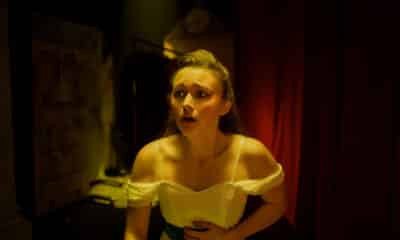

Film Reviews
/ 14 hours ago‘Fear Street: Prom Queen’ review: Dir. Matt Palmer (2025)
It has been four years since Leigh Janiak’s Fear Street trilogy took horror fans...
By Kat Hughes -
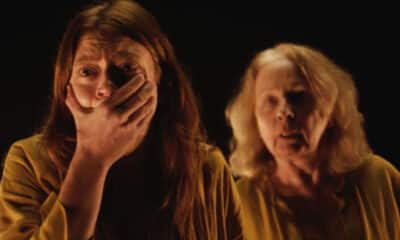

Film Reviews
/ 14 hours ago‘The Surrender’ review: Dir. Julia Max (2025)
As Julia Max’s debut feature, The Surrender, unfolds, the inspirations for the film become...
By Kat Hughes -
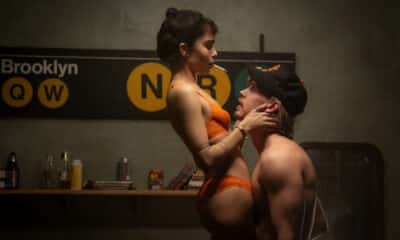

Film Trailers
/ 2 days agoFirst trailer for Darren Aronofsky’s ‘Caught Stealing’
Sony Pictures has released the debut trailer for Darren Aronofsky’s new film Caught Stealing,...
By Paul Heath -
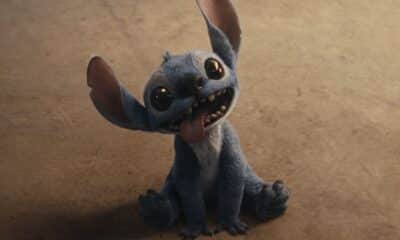

Film Reviews
/ 3 days ago‘Lilo and Stitch’ review: Dir. Dean Fleischer Camp (2025)
Director Dean Fleischer Camp won audiences over with the fantastic Marcel the Shell with...
By Kat Hughes
